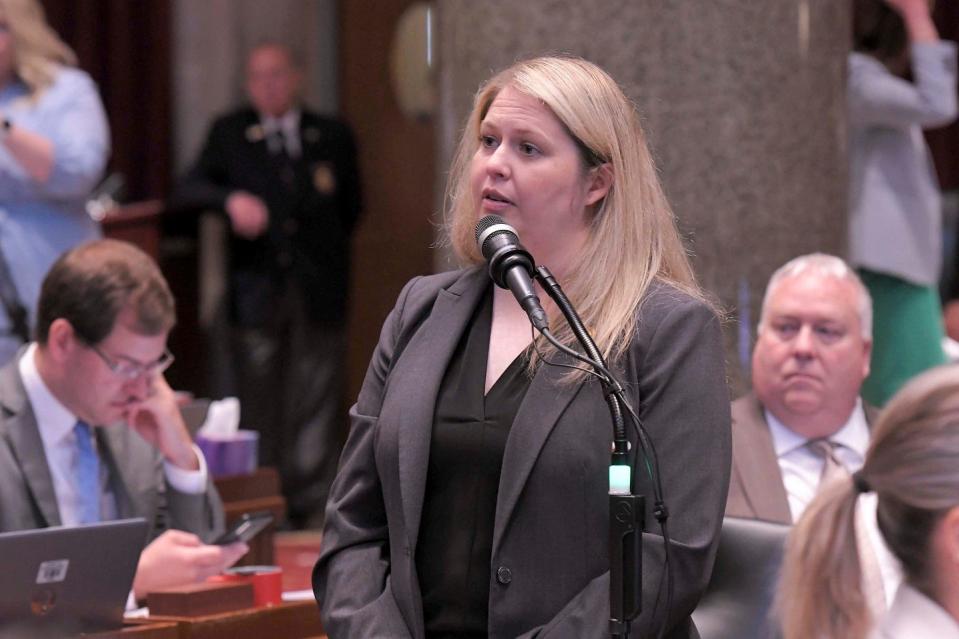House committee to vote on changing rules for prior authorization, insulin price caps
While the Missouri Senate devolved into infighting at the end of last week — culminating in an eight-hour filibuster Thursday — the Missouri House has been relatively quiet in comparison, with all of last week's sessions ending in under an hour.
The real work has been happening in the legislative committees, where lawmakers gather to consider bills, hear public testimony and vote on whether or not to advance legislation.
One committee in particular, the House Committee on Healthcare Reform, is poised to consider three bills from Springfield Rep. Melanie Stinnett, as well as legislation capping the price of insulin and allowing for the disbursement of a year’s worth of birth control at a time. Stinnett serves as vice chair of the committee.

Stinnett’s background is in the health care field, where she works as a speech pathologist, although she has worked in many positions across the continuum of health care.
“In 2014, I opened up a private practice in Springfield, providing speech therapy, mostly for children with disabilities, and then grew that practice to providing speech, occupational, physical and music therapies,” Stinnett said.
In 2022, her practice was acquired by the Arc of the Ozarks, an organization that works to enhance the lives of those living with intellectual or developmental disabilities. She remains involved with managing and directing the therapy services, which extend beyond the practice into rural public schools as well.
However, during that time, Stinnett saw the impact of legislative policy on the health care industry and got involved in advocacy.
“What got me interested in running for office was about seven or eight years of that (time working in practice) I spent doing advocacy work at the Capitol on behalf of small businesses and health care and children with disabilities and issues surrounding those topics,” Stinnett said.
Her legislation comes from a place of personal understanding and firsthand knowledge of how the health care industry operates in practice.
“I'm really passionate about all of the issues surrounding the bills that I file and really find a pretty personal connection to all of them,” Stinnett said.
More: Early in session, lawmakers set sights on addressing child care crisis in Missouri
Stinnett hopes to ease burdensome prior authorization requirements
That passion showed through in her presentation of House Bill 1976 to the Healthcare Reform Committee last week, as she recounted experiences patients have faced with prior authorization restrictions on their insurance coverage.
This bill would allow health care providers that have achieved 90% prior authorization approval for health care services during a six month evaluation period to be exempted from requirements to submit for prior authorization for the six months following that evaluation period.
Stinnett provided examples from patient experiences that she witnessed firsthand. One child was born with congenital hearing loss, but the absence of the proper medical coding mechanism with the insurance company led to a struggle to receive prior authorization for insurance to cover treatment.

Another child, born at 27 weeks, was unable to eat food by mouth. She was fed via a feeding tube, and when she finally progressed to eating pea size bites of food, insurance pulled the rug out from underneath them.
“We went through the process — appeal, peer-to-peer and actually had to report that one to the Department of Insurance to finally get that coverage,” Stinnett said.
Stinnett feels her legislation would help not only patients and health care providers, but insurance companies, too, as it would cut time and cost for all parties involved in completing the prior authorizations.
“It's not only the access to care, but it's also the cost of care,” Stinnett said. “In many of our clinic settings, we have whole staff that are dedicated to submitting and following up on prior authorizations.”
Testifying in support of the legislation was John Paulson, a family physician in Joplin. While he deals with this in his professional capacity as a doctor, the issue also personal for him, as his wife struggles to obtain her life-saving medication due to prior authorization hassles.
He cites a national study from the Healthcare Financial Management Association showing that manually filing a prior authorization claim cost about $11 each and electronic filings cost around $4 per filing, leading to $528 million spent on these claims in the U.S. in 2019.
Testifying in opposition was Sean Stephenson of the Pharmaceutical Care Management Association who argued that the “primary goal of prior authorization is one, to ensure the appropriateness and suitability of the prescribed medication for that specific patient, two, safety, and three to control cost.”
He noted that most health insurance providers have a prior authorization appeals process. Stephenson also raised concerns that waiving prior authorization could result in patients being prescribed drugs with dangerous interactions, a factor that is monitored by these mechanisms.
More: Mark your calendar with these important 2024 Missouri election dates
Committee to hear bills on prenatal blood tests, telehealth
Stinnett has two additional bills up for public hearing on Tuesday afternoon — one focused on expanding telehealth services to include audio options in state statute, and another aimed at improving prenatal blood test procedures.
During the pandemic, telehealth became an essential health care tool for many unable to leave their homes. However, it exposed the cracks in the state’s high-speed internet access.

“The audio only options were really great for those people who still needed to try and access care that could be done over the audio only option, but also for seniors that may have challenges with technology use overall,” Stinnett said.
Stinnett’s bill would ensure that audio-only telehealth is codified in state statute so those options remain open for providers and patients to choose what method is right for them.
The second bill hopes to improve birth outcomes by adding a second prenatal blood test requirement to state statute. Currently, a blood test checking for viruses and diseases is conducted at a woman’s first prenatal visit, but such early testing can often miss health concerns that arise later in pregnancy.
Her legislation would require a second blood test be conducted at 28 weeks in order to ensure none of the viruses are present.
“It’s another bill to really target infant health and maternal health and really focus on making sure our moms and our babies are healthy,” Stinnett said.
In Missouri, the average pregnancy-related mortality rate was 32 deaths per 100,000 live births from 2018-2020. Nationally, Missouri ranks 44th, among the worst states for maternal mortality.
Missouri was one of four states in which infant mortality increased from 2021 to 2022. According to the Centers for Disease Control and Prevention, infant mortality increased 16% in this time frame, with infants dying at a rate of 6.8 per 1,000 live births during the first year of life.
Bills capping epinephrine, insulin prices, extending birth control scripts expect committee decision Tuesday
Two bills, as well as Stinnett’s prior authorization legislation, will be receiving a final vote at the committee meeting Tuesday, including a bill looking to cap the price of insulin and epinephrine, and legislation that would allow women to fill a year’s worth of their birth control prescription at one time.
Rep. Sean Pouche, R-Kansas City, feels that the high prices of insulin and epinephrine, both live-saving medications, are forcing some families to make impossible choices between their health and other bills.
“They are rationing their insulin. They are deciding not to buy their insulin and they're buying groceries instead or paying their rent or their mortgage,” Pouche said.
His legislation would cap the price of 30-day supplies of insulin at $35, which is already in place federally for some recipients, and epinephrine at $100.
“Epinephrine costs, in 2007, was $109 for a two-pack. Last July, it was $700 for a two-pack,” Pouche said.
Rep. Tara Peters, R-Rolla, sponsored the legislation ensuring access to a year’s worth of birth control at a time, something she feels is essential for women hoping to avoid pregnancy in a state where almost all abortions are illegal.
“We have now moved into a post-Roe era,” Peters said. “And so because of that, I believe that we need to provide women in the state of Missouri every tool possible to its full extent to make sure that we do not have unintended pregnancies.”
This article originally appeared on Springfield News-Leader: Rep. Melanie Stinnett seeks health care reform in trio of bills

